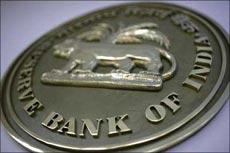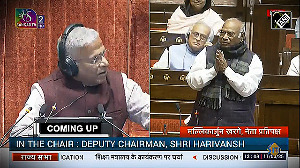 The Reserve Bank of India would further raise key rates if inflation continued to rise, RBI Deputy Governor K C Chakrabarty said.
The Reserve Bank of India would further raise key rates if inflation continued to rise, RBI Deputy Governor K C Chakrabarty said.
Defending the rate hike announced on Friday, he said short-term growth could be scarified for long-term growth. "Absolutely, we will raise rates even before the policy dates if inflation goes up. The RBI governor is continuously watching the situation. Unproductive demand has to be curtailed. It is up to banks to increase the rates, but RBI is giving the signal that there is a need for rates to go up if you have to anchor inflationary expectations," Chakrabarty said after an interactive session at bankers' club in Kolkata.
"The deposit growth is only 13 per cent. We have to give better return to savers. The credit growth is higher, inflation is picking up, and so we have to curtail credit demand. We will not announce it in advance. It may be before or after the policy decision," he said.
To tide over the current liquidity squeeze, RBI was open to injecting more liquidity into the system, he said.
Also, the cut in the government's weekly borrowing was a temporary measure to manage liquidity, he said.
"That is a temporary measure. This way we manage the frictional liquidity. Soon, it will come back. If it (liquidity) not there, we will introduce it. We will ensure that the productive sectors of the economy are not deprived of credit," Chakrabarty said, referring to the Rs 3,000-crore (Rs 30 billion) cut in immediate market borrowings.
The government has reduced the size of debt auctions for this week by Rs 3,000 crore due to the liquidity crunch. Lending to telecom companies to pay for spectrum for third-generation mobile services and advance tax payments are behind the liquidity squeeze.
Asked if interest rates were rising due to tightening liquidity, Chakrabarty said, " No bank is saying liquidity is a problem. In a fraction of a second, RBI action has brought down effective lending rates by 400 basis points. Earlier, (it was said) that the PLR (prime lending rate) system and the circulation mechanism were not working. Now, the transmission mechanism has worked with the base rate."
RBI has raised rates twice since mid-March, by a total of 50 basis points, to rein in inflation.
"What will happen to the economy, the impact of monsoons, we will have to wait till July 27. If the inflation rate is coming down, it will be reflected. We have said that inflation will come down from double digit to 5.5-5.6 per cent by the end of March in the policy statement," said Chakrabarty.
India's food price index increased 12.92 per cent in the year to June 19, lower than the previous week's annual rise of 16.9 per cent, mainly on account of the high base effect.
On May 28, RBI announced a second round of liquidity adjustment facility window for banks for up to 0.5 per cent of their deposits. In addition, RBI last month offered to buy back government bonds for up to Rs 20,000 crore (Rs 200 billion) to increase liquidity in the banking system.
RBI has forecast that headline inflation will ease to 5.5 per cent by March 2011. It will come out with its policy review on July 27.







 © 2025
© 2025